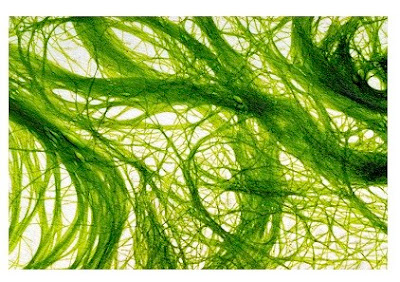Symphony Environmental has announced that it has signed a collaboration agreement and commitment to a strategic investment (“Agreement”) with Eranova SAS (“Eranova”), a company registered in France.
Using Pollutant as a Source to Manufacture Bioplastics:
Eranova has developed a unique technology and process (the “Technology”)
which extracts starch from algae for use with other materials. The
starch can be combined with other polymers to produce compounded resins
which are compostable and biodegradable. These can be used to
manufacture a wide range of finished products (“bioplastics”).
In addition, the Technology can be developed to produce biofuel,
biopolymers, proteins for food and animal feed stock, as well as
by-products for the pharmaceutical and cosmetic industries. Eranova is
the applicant for PCT patent WO 2017/0463656 A1 and the application has
been registered in several territories.
The importance of the Technology is that it will be possible to
manufacture polymers from natural raw materials without the need to use
arable land and fresh-water resources normally used for growing food
crops. There is also a synergy with Symphony’s existing technologies to
enhance the technical performance of polymers that will use the
Technology.
The Main Terms of the Agreement are:
- The Group will initially subscribe €500,122 for an 8% shareholding in Eranova when fully funded to start its pre-industrial development (the “Subscription”)
- The Group will have an option to subscribe at market value for further shares to increase its shareholding to 51% of Eranova’s enlarged issued share capital, exercisable in one or more tranches at any time within three years after the initial investment
- Symphony will have representation on the Board of Eranova
The Subscription is subject to completion of due diligence to the satisfaction of Symphony’s Board including confirmation that all other funding for Eranova is in place and ready to drawdown to start its pre-industrial development. The Subscription is financeable within Symphony’s current resources.
In addition, Symphony will have the right to purchase 75% of Eranova compound made in the Middle East and North Africa, for sale as compound or in manufactured finished products within the Middle East region exclusively, and on a non-exclusive basis globally, excepting thirteen(mainly European) countries for which Eranova will have exclusivity.
Symphony’s Investment
Eranova requires a total of €4,790,000 to start its pre-industrial development and Symphony’s investment represents one of the final tranches required. The project has won the backing of ADEME, (the French Environmental & Energy Management Agency), who after due diligence by KPMG, are supporting the project with €1,031,000 of funding. Eranova is also receiving funding from PACA (the French region of Provence Alpes Cote ‘d’Azur) together with private investment and soft loans.
Pre-industrial Development:
Pre-industrial development is expected to start in the second half of
2018 and will consist of constructing long seawater tanks, called
“raceways”, where Eranova will optimize cultivation of algae for the
production of the starch extract. The raceways constructed during this
phase will represent 1/50 scale of a full commercial facility and will
cover 1.2 hectares.
This phase will also involve conversion of the resultant starch into
bioplastic compounds. Eranova has signed an agreement to begin
installation of the pre industrial development with the Grand Port de
Marseille, and TOTAL TDR, a division of the TOTAL petrochemical company,
will be supporting certain employment costs due to the innovative
nature of the Technology.
The current majority owners, and directors, of Eranova are Philippe
Michon, who is, and has been Symphony’s French distributor for over
thirteen years, and Phillipe Lavoisier, a chemical engineer who has
invented the Technology. He was an R&D manager at 3M and has worked
for many years in the plastic film industry.
The Key Benefits of the Technology are:
- Using a natural renewable waste product which pollutes beaches
- A non-food-based resource (compared to corn or potatoes)
- Higher yields per hectare due to the fast growing-rate of algae compared to food-crops
- Early stage processing shows good mechanical properties and competitive cost
- Potential new markets for by-products of the TechnologyPre-industrial development is expected to start in the second half of
2018 and will consist of constructing long seawater tanks, called
“raceways”, where Eranova will optimize cultivation of algae for the
production of the starch extract. The raceways constructed during this
phase will represent 1/50 scale of a full commercial facility and will
cover 1.2 hectares.
This phase will also involve conversion of the resultant starch into bioplastic compounds. Eranova has signed an agreement to begin installation of the pre industrial development with the Grand Port de Marseille, and TOTAL TDR, a division of the TOTAL petrochemical company, will be supporting certain employment costs due to the innovative nature of the Technology.
The current majority owners, and directors, of Eranova are Philippe Michon, who is, and has been Symphony’s French distributor for over thirteen years, and Phillipe Lavoisier, a chemical engineer who has invented the Technology. He was an R&D manager at 3M and has worked for many years in the plastic film industry.
The Key Benefits of the Technology are:
- Using a natural renewable waste product which pollutes beaches
- A non-food-based resource (compared to corn or potatoes)
- Higher yields per hectare due to the fast growing-rate of algae compared to food-crops
- Early stage processing shows good mechanical properties and competitive cost
- Potential new markets for by-products of the Technology





No comments:
Post a Comment